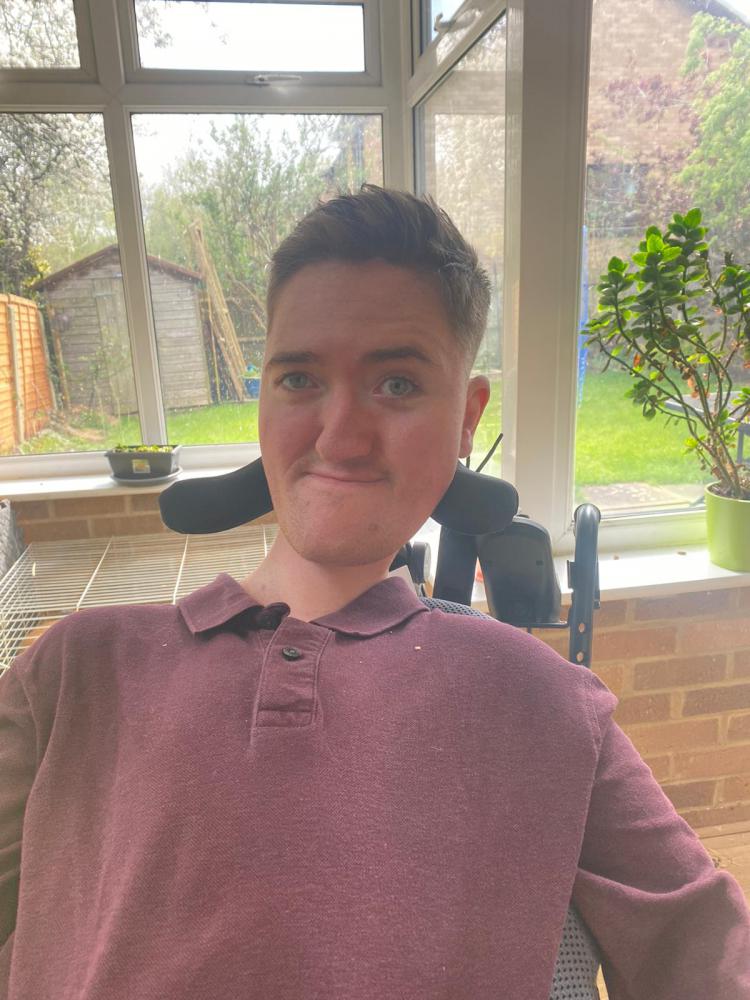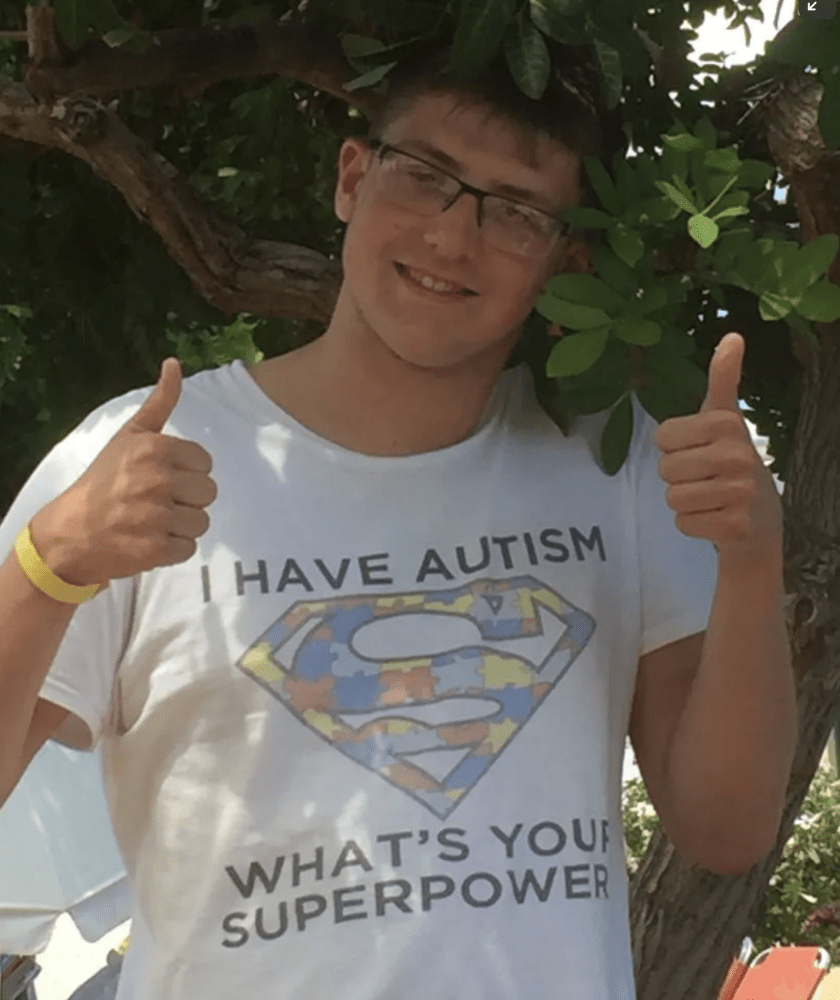Ben, a 22-year-old man from Swindon born with Spinal Muscular Atrophy, will be moving to London this September to pursue his career in journalism and broadcasting.
Ben's condition means that the messages from his brain do not get to his muscles properly.
He says it is a progressive condition but when the individual reaches adulthood, it tends to plateau out as there is no longer a fight against a growing body.
He has the use of three of his fingers, but requires carer support and uses a wheelchair.
Ben is also currently testing out a newer kind of treatment for his condition.
He said: “This treatment forces the body to create more of the protein that I’m lacking. It is seeming to help me so far – I’m eating a lot more, and this is a good sign. Overnight I currently have to use a ventilator, but recently I got a letter from the doctor saying that there is scope for me to use it less – which is also good news.”
“There are a lot of barriers to life, but I think with the right technology, and the right support, you can get a lot done.”
Already overcoming the odds set against his health and survival (he was given a life expectancy of 2 years when born), Ben has also broken further barriers by successfully earning his place on the BBC’s Advanced Journalism Apprenticeship Scheme 2023.
There were around 2,000 applicants and 22 places.
He described what opportunities this apprenticeship could bring his way: “I will be working specifically with BBC News. I’m not sure what department I’m going to be put in yet – it could be anything.
“I’ll be helping to find stories, to film and edit etc. I probably won’t be able to be on-screen for at least the first year though.”
He added: “It’s a Level 7 apprenticeship - equivalent to a Masters Degree. After that, on my briefing, it says effectively ‘you’ll get a job at the end of this.’”
Before getting this big break, Ben studied Journalism at Winchester University, specialising in broadcasting. But journalism wasn’t always Ben’s original plan.
He explains: “I originally wanted to be a doctor or a scientist, because I was determined to help cure my own condition which sounds a bit pathetic – plus I realised I wasn’t the best at Science at school.
“So then I was thinking about what other career sectors I had been exposed to, I thought about reporting, as I was used to having reporters around me a lot, and talking to them. I found I had a good idea of what people wanted to read in a story.
“I really played on the whole disability thing when I first started, as I wanted to get the representation for my condition out there. However, you start doing the stories and realise quickly that it’s not about you – it’s about the people you’re talking to, and writing about.
“It’s the journalist’s job to get the stories out there that wouldn’t normally be told – and if I can get disability representation out there at the same time, then great, but it’s not my main aim!”
Ben has also been working with local organisations to further hone his skills and gain experience.
He is currently working with the local radio station Swindon 105.5, and undertook some work experience with the Swindon Link team a few years ago.
Ben said: ““I worked with Swindon Link before university, and since September of last year, I’ve been with Swindon 105.5. They’ve been great and adapted the workspace for me.
“I’m sort of like the dedicated teacher at Swindon 105.5 at the moment, and I’m helping out the station manager, Shirley Ludford. If a new trainee comes in, I help show them the ropes and teach them what they will need to know. I also do reporting and editing.
“I’ve found people won’t employ you within the journalism game if you don’t have previous work experience. It’s frustrating as if you can’t get any jobs, you’ll never gain the work experience. Swindon 105.5 are very accepting and just take people on.
“I think these local work experience/volunteering opportunities have really increased my passion for journalism.”
As well as working with local organisations, Ben also applied for the BBC’s Young Reporter competition a few years ago.
He recounts: “Before I went to university, I entered the BBC Young Reporter competition, and got through to one of the final stages and appeared on the One Show. This was around 2018 or 2019.
“Then I also applied for the BBC’s Advanced Journalism Apprenticeship Scheme last year, and didn’t even get through the first or second round. I tried again this year, went all the way, and successfully earned my place!”
Had the BBC apprenticeship opportunity not presented itself to him, Ben had a back-up plan. He would go back into education.
He said: “My other plans were to apply to do a Masters in Philosophy at Cambridge University if I did not get in at the BBC.
“I would’ve wanted to have focused my research on the culture of Film and TV. I was thinking that out of that, theoretically, I might be able to find out how to get disability representation sorted.
“But like I said, that would have been a more theoretical approach, whereas this opportunity with the BBC will give me the opportunity of a more hands-on approach to helping with disability representation.”
The young journalist also says he has a passion for documentaries.
He added: “I had to make a documentary for my end of year project at university. It was in place of a dissertation as our course was broadcast-based.
“My documentary was on society’s dependence on technology. I gave up my phone, laptop and PlayStation for a week documented my journey into insanity!”
Ben’s documentary ‘Disconnected’ can be found on YouTube at https://www.youtube.com/watch?v=OTFvZ9rm0fE&feature=youtu.be
Counting down the months until September, Ben is now turning his attention to getting everything in order for his move to London. Although exciting, this move, will not come without its own challenges for him.
Ben added: “Accomodation is going to be a major issue as I can’t just go on RightMove. I’ve had to find specialist agents that deal specifically with accessible accommodation.
“I need to find somewhere that is affordable and accessible at the same time which can be difficult. Transport to the BBC building needs to be accessible for my wheelchair too.”
Ben said this window of time until his move has also given him time to reflect on things.
He mused: “I think it’s quite interesting that the media and the press are interested in my story. If I could walk, I don’t think newspapers would give as much of a damn. I think through more disability representation, that will sort of fizzle out, but then would that in itself reduce the disability representation? It’s a complex question.
“I had a bit of a moment the other night where I was questioning whether I was just approved because I am disabled, or whether it was due to my skills. But then I thought, any publicity is good publicity, and that it may be a bit of both.”
When asked about his future career plans, Ben said he would ideally like to stay with the BBC long-term.
He explains: “I would love to stay with the BBC for the long-term and really strive to become a presenter.”





Your Comments
Be the first to comment on this article
Login or Register to post a comment on this article